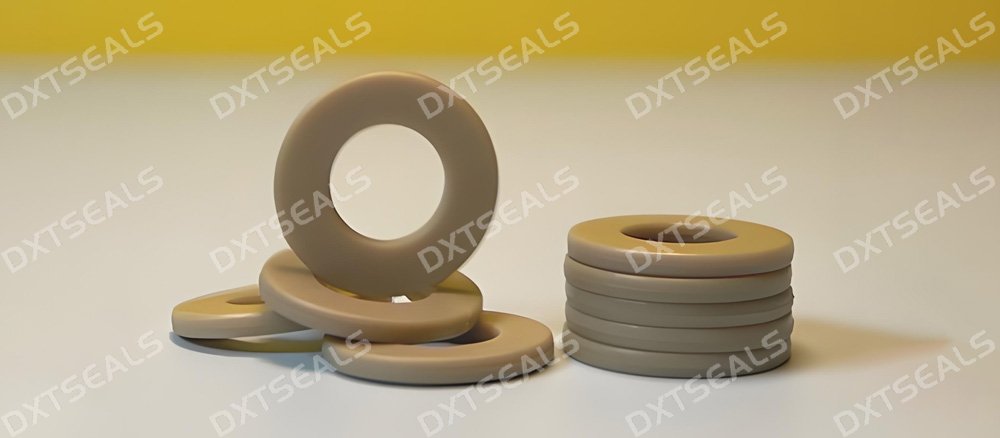
When choosing the right engineering plastic, Polyetheretherketone (PEEK) and Polytetrafluoroethylene (PTFE, commonly known as Teflon) are two of the most widely used high-performance polymers. Both offer exceptional chemical resistance, thermal stability, and mechanical properties, but they excel in different applications.
This article provides a detailed comparison of PEEK and PTFE, helping you determine which material is best suited for your specific application.
1. Overview of PEEK and PTFE
1.1 What is PEEK?
PEEK is a semi-crystalline thermoplastic polymer known for its high strength, excellent wear resistance, and outstanding thermal stability. It is commonly used in aerospace, automotive, medical, and industrial applications where extreme performance is required.
✔ High mechanical strength
✔ Continuous use temperature up to 250°C (482°F)
✔ Exceptional wear and abrasion resistance
✔ Excellent chemical resistance
✔ Good electrical insulation properties
1.2 What is PTFE?
PTFE, commonly known as Teflon, is a non-stick, chemically inert, and low-friction material widely used in seals, gaskets, coatings, and electrical insulation. It is favored for its extreme chemical resistance and temperature stability.
✔ Outstanding chemical resistance
✔ Very low friction and self-lubricating
✔ Continuous use temperature up to 260°C (500°F)
✔ Excellent electrical insulation
✔ Non-stick and hydrophobic properties
2. Key Differences Between PEEK and PTFE
| Property | PEEK | PTFE (Teflon) |
|---|---|---|
| Mechanical Strength | High (strong and rigid) | Low (soft and flexible) |
| Temperature Resistance | Up to 250°C (482°F) | Up to 260°C (500°F) |
| Chemical Resistance | Excellent | Outstanding (better than PEEK) |
| Wear Resistance | Very high | Low (prone to deformation under load) |
| Friction Coefficient | Moderate | Very low (self-lubricating) |
| Electrical Insulation | Good | Excellent |
| Water Absorption | Low (0.1%) | Almost zero (0.01%) |
| Machinability | Good (can be precision machined) | Difficult (soft and can deform easily) |
| Cost | Higher | Lower |
3. When to Choose PEEK?
PEEK is the better choice when:
✔ High mechanical strength is needed – PEEK is much stronger than PTFE and can withstand high loads.
✔ Wear resistance is important – Ideal for bearings, bushings, and gears.
✔ Precision machining is required – PEEK holds tight tolerances better than PTFE.
✔ Applications require high temperatures – PEEK maintains strength up to 250°C (482°F).
✔ Metal replacement is desired – Often used in aerospace and medical applications as a lightweight alternative to metal.
Industries Using PEEK:
- Aerospace & Automotive – Lightweight, high-strength parts
- Medical & Healthcare – Implants, surgical tools, sterilization-resistant components
- Oil & Gas – Seals, valve seats, and high-pressure components
- Industrial Machinery – Gears, wear rings, and bushings
4. When to Choose PTFE?
PTFE is the better choice when:
✔ Low friction is essential – PTFE has a very low coefficient of friction, making it perfect for seals and sliding applications.
✔ Extreme chemical resistance is required – PTFE can withstand almost all industrial chemicals and solvents.
✔ Non-stick properties are needed – Ideal for food processing and coating applications.
✔ Electrical insulation is required – PTFE is one of the best dielectric materials.
✔ Cost is a concern – PTFE is more affordable than PEEK.
Industries Using PTFE:
- Chemical Processing – Pipes, seals, and gaskets resistant to aggressive chemicals
- Food & Beverage – Non-stick surfaces, FDA-approved components
- Electronics – High-performance insulators and cable coatings
- Medical Equipment – Catheters, tubing, and lab equipment
5. Cost Considerations: PEEK vs. PTFE
- PEEK is significantly more expensive than PTFE due to its higher strength and superior thermal properties.
- PTFE is the cost-effective option when mechanical strength is not a primary requirement.
- The long-term performance of PEEK can reduce maintenance costs and increase durability in demanding applications.
6. Conclusion: Which Material Should You Choose?
| Choose PEEK if you need: | Choose PTFE if you need: |
|---|---|
| High strength and rigidity | Soft, flexible material |
| Superior wear resistance | Low friction and self-lubrication |
| High precision machining | Cost-effective plastic |
| Excellent dimensional stability | Extreme chemical resistance |
| A strong alternative to metal | Non-stick properties |
Final Recommendation:
- If you need high mechanical performance, wear resistance, and durability, PEEK is the superior choice.
- If your priority is chemical resistance, non-stick properties, or cost-effectiveness, PTFE is the better option.
Both materials have unique advantages, and the best choice depends on your specific application needs.
